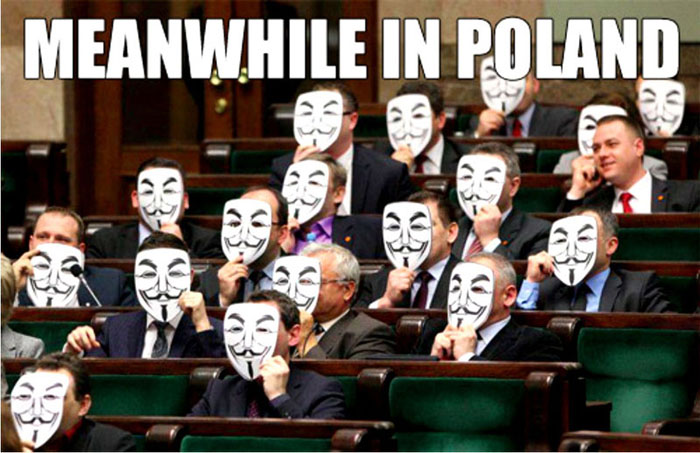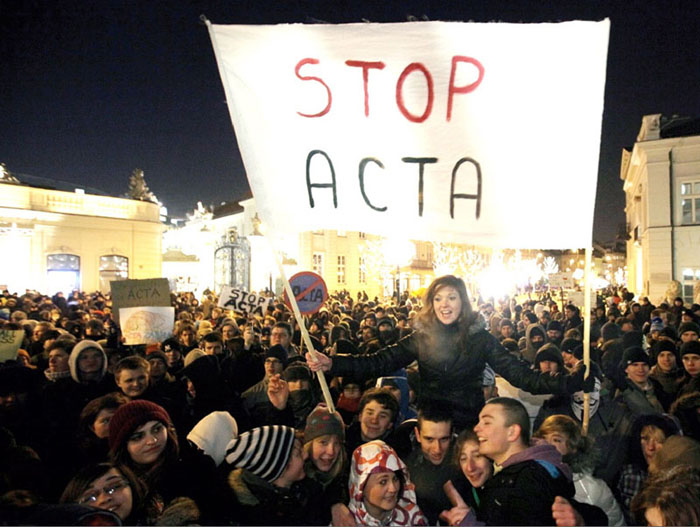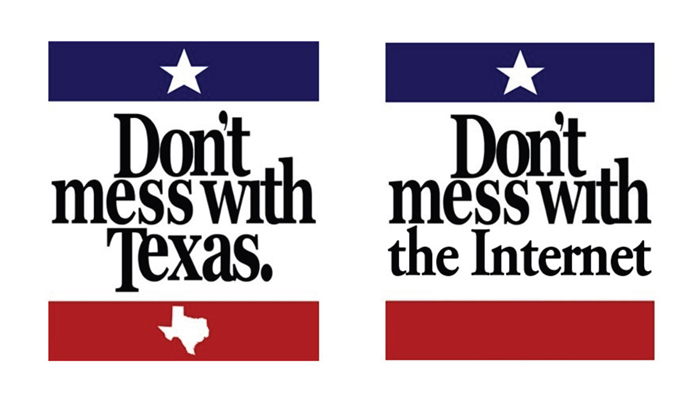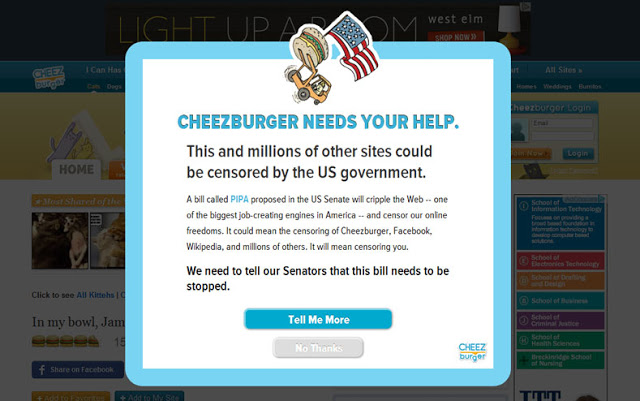Hacking Politics: How Geeks, Progressives, the Tea Party, Gamers, Anarchists, and Suits Teamed Up to Defeat SOPA and Save the Internet (46 page)
Authors: and David Moon Patrick Ruffini David Segal
Tags: #Bisac Code 1: POL035000

We created a movement. One that was decentralized, bottom up, and insanely chaotic. One that very much resembles the Internet. We created a meme—the SOPA meme—that propagated throughout the web and mutated into various forms (show toilet paper, tshirt, the day the lolcats died, etc). We harnessed the power of the Internet to reach out to millions upon millions of people. We rode the energy and momentum arising from the SOPA meme to kickstart the ACTA meme in Europe—members of the Polish parliament even wore Guy Fawkes masks in protest! And we showed the other side that we would not stand for backroom deals, special interests, or companies trying to preserve their outmoded business models at the expense of the open Internet. People called it the “Internet Spring.”


The other side has lots of money; in fact, they spent nearly $100 million last year trying to get SOPA passed. But we have one thing that they don’t: the Internet. You know that old slogan from Texas? Don’t mess with Texas. Well, some of us wanted to make sure Lamar Smith, the congressman from Texas who proposed SOPA, heard our version of the slogan: don’t mess with the Internet. A group of us, led by reddit cofounder Alexis Ohanian, started a crowd-funding effort that turned the slogan into a billboard in Lamar’s Texas district.

It’s up to all of us to keep fighting, because this is far from over. The content industry is trying to fight from every angle they can. Their networks extend from executives of global corporations through various national trade representatives down to local mayors and city council members. We cannot let them win with their old school tactics. We do things differently on the Internet. Talk to your friends, tell your local politicians, and stand up for Internet freedom. Build technological tools, make videos, blog about it. The open Internet gives us the power to break free from the constraints and control of old media. This is not
about Hollywood versus Silicon Valley. It’s about preserving the very nature of the most vital tool of communication and expression and the millions of people who rely on it.
I am here to say loud and clear: Do not mess with the Internet. We are here. We are legion. And our voices will be heard.
BEN HUH
Ben Huh is an Internet entrepreneur and the CEO of The Cheezburger Network, which receives three hundred seventy-five million views a month across its fifty sites. Huh was an outspoken opponent of SOPA/PIPA and helped lead the fight against SOPA by blacking out his sites on January 18, 2012
.
To understand any viral movement requires an understanding of the zeitgeist of their anger. Right now, thousands of sites big and tiny have gone dark or shut down in protest of SOPA and PIPA. What’s more remarkable is that for most of us, we are engaging in a new form of protest—the Social Disobedience.

Bun Huh’s Cheezburger website carried the above action alert that popped up on visitors’ screens January 18, 2012.
Unlike the Civil Disobedience of half a century ago, the Internet Generation (my 34-year-old self included) is using a more accessible and web-centric form of protest. The Internet Generation has virtually no money to speak of and doesn’t consider themselves influential in any way, but the groundswell of anger and frustration against censorship has encouraged a generation raised on apathy and recessions to take up arms against the powers that be. And the only arms they know of is their voices.
It would be foolish and irresponsible for politicians to ignore this form of protest. While it’s harder to ignore the protester on your doorstep, ignoring Social Disobedience will erode the social capital of any campaign—just ask any company who dealt with a user-revolt on Facebook or Twitter.
While the blackouts of Google and Wikipedia are notable and far-reaching, the insecure, unemployed graduate student expending their social capital to call attention to a political issue is the heart and soul of Social Disobedience. By leveraging their blogs, Twitter, Facebook, and their iPhones, the accidental protester is finding out just how power feels—and it feels right.
When the “young people” showed up to vote for Obama and when the “youth vote” put Ron Paul in the race—turning out and defying stereotypes—they are succeeding in their form of Social Disobedience. This is a generation that is highly educated, highly expressive, and restless.
The rallying cry of the 1960’s was Love and Peace. The 2010’s brought us Openness and Free Expression. The groundswell against SOPA and PIPA isn’t just a reaction to the censorship, it’s the reaction to a real threat to these values we hold closest to our hearts. This is a generation who has seen the erosion of influence from voters to corporate interests with money. The only power that remains in the hands of this generation is their self expression, and SOPA/PIPA sought to restrict this last bastion. This is the zeitgeist of their anger.
During all my debates and interviews, it’s hard not to notice the growing chasm between those born of the Web and those born before. For men like Rupert Murdoch, the Internet is something to be controlled, feared, and
regulated. For the Internet Generation, it’s a rare freedom to be protected, celebrated, and shared. It’s difficult to feel any sympathy for the Rupert Murdochs of the world (and their businesses) who complain that the politicians he paid changed positions in the face of voter protest. And it’s painful to watch former Senator Chris Dodd take the top job with the MPAA and call our Social Disobedience “an abuse of power.”
We can criticize the Internet Generation for being superficial, shallow, and self-interested, but so is every generation in their youth. And now, we watch in awe as they flex their voices in unison in Social Disobedience.
We’re all proud of you, Internets. And don’t let anyone silence you.
DAVE DAYEN
Dave Dayen has been writing about politics since 2004. He engaged in the SOPA/PIPA battle as both an activist and as somebody who makes his living through work on the web, on FireDogLake-a site that relies on user-generated content and would have been harmed by the passage of this legislation. He spent three years blogging for the FDL News Desk at
news.firedoglake.com
, he’s written for a variety of publications, online and off-, and his work has been cited in a variety of traditional and new media. He lives in Los Angeles
.
Writing about Congressional policy during the 112th Congress could be best summarized as the journalistic equivalent of working as a crash test dummy: your task was to dutifully slam into a brick wall every day for two years, as any legislation that you wrote about would almost certainly fall prey to obstruction and gridlock, without any hope of progress. So it was rare indeed in these years when I would hear about legislation on the fast track to swift passage.
In fact, the first time I wrote about SOPA and PIPA came in the context of a separate failed bill. Senate Democrats had just voted down a resolution of disapproval, put together by Republicans, on the Federal Communications Commission’s net neutrality regulations (which, incidentally, aren’t terribly good). Every Senate Democrat rejected this resolution, which would have invalidated the regulations, and from the outside, you would have concluded that the caucus favored the principles of Internet freedom and rejected corporate profiteering of the World Wide Web. This actually represented an advance; Senate Democrats weren’t always explicitly on board with net neutrality, and to hold the entire caucus, from Bernie Sanders to Ben Nelson and everyone in between, is quite a legislative feat on anything of consequence.
But at the exact same time as Senate Democrats voted down net neutrality repeal, many of them were scheming to bring so-called anti-piracy legislation to the floor. The two bills coming up at the same time represents a common, devious tactic: make a big show of solidarity with a community or interest group on one bill, while selling them out on the side. So if the interest groups complained, individual members could simply point to the other vote, and add, “This other thing isn’t that bad, trust us, we just showed you we’re on your side, right?”
The timing also struck me. Congress, which typically did almost nothing in November and December without a good reason, had planned hearings and markups and votes for SOPA and PIPA during this period. From the beginning, the key sponsors sought passage at the end of 2011, when public attention focused anywhere but Washington. They obviously wanted it to slip through unnoticed.
In November, Sen. Ron Wyden had vowed to place a hold on the bill, but I knew that wouldn’t mean much. “Holds” and other Senate rules don’t matter to leaders when they really want to make the effort to pass the legislation in question. Here’s an example: throughout the first two years of Democratic Senate control in 2007–2008, Republican Tom “Dr. No” Coburn would routinely hold up virtually any spending bill on the grounds that the country’s deficit was too high. In almost every case, the holds got honored, even when the bills held widespread support. Harry Reid didn’t want to take the floor time to beat the filibuster. But in 2008, Democrat Chris Dodd placed a hold on legislation to immunize telecoms from their liability participating in warrantless wiretapping. Despite Dodd’s longtime tenure, despite the typical practice of honoring holds, despite his own party’s control of the chamber, eventually the Senate took the time and broke Dodd’s filibuster and immunized the telecoms. This seemed like the same thing. If they really wanted SOPA and PIPA, they could break Wyden.
By this point, those of us who create content online understood the dangers of empowering the government to demand that ISPs slow down or block individual sites based on subjective copyright claims. Firedoglake is not just a group blog, but a site that encourages and facilitates user-generated content. Anyone with an FDL account can post a diary at MyFDL. If a diary—potentially even a comment—contained what a copyright holder perceived as proprietary content, the entire site could conceivably get shut down. In the event of SOPA/ PIPA passage, the next logical step for FDL would have been to take down all the user-generated functionality, and obsessively monitor the remaining posts to ensure copyright-free content. This defeats the entire purpose of a site like FDL, where community content gives people ownership in the site, creates an activist base and ultimately brings people back every day. Cutting off their voice would quickly lead to an atrophying of the site. People flocked to political blogs to get away from the one-way, top-down dissemination of traditional media. This legislation would return us there, and would probably result in the end of my job as an online journalist.
